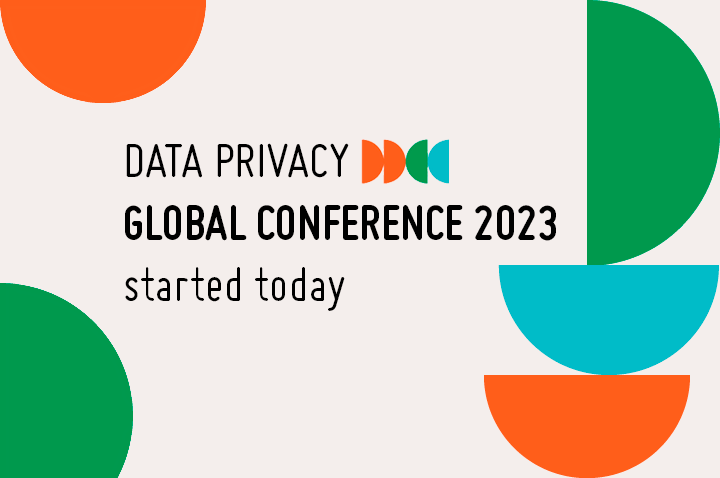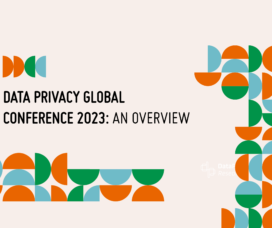Data Privacy Global Conference 2023 started today
Data Privacy Global Conference, organized by Data Privacy Brasil, started this Monday (November 27th) in São Paulo, at the ESPM School.
Data Privacy Global Conference, organized by Data Privacy Brasil, started this Monday (November 27th) in São Paulo, at the ESPM School.
This is the second edition of DPGC, a unique venue for Global South conversations about digital rights, digital public infrastructures, and the rise of artificial intelligence. Our goal is to expand the knowledge about regulation from the perspective of the Global South, gathering professionals of different backgrounds in a specialized forum.
In this blog post, we will explain the main topics discussed in the opening panel of the conference. The panel was moderated by Mariana Rielli, director of Data Privacy Brasil. The speakers were Marcelo Crespo (ESPM), Ava Mumtaz Haidar (Aapti Institute), Miriam Wanjiru (Paradigm Initiative), Miriam Wimmer (Brazilian Data Protection Authority), Renata Mielli (Internet Steering Committee/CGI), Eduardo Gomes (Federal Senate).
A glimpse of the opening session
Mariana Rielli, co-director of Data Privacy Brasil, started the conference mentioning that the Data Privacy Global Conference is gathering 40 speakers and participants from more than 110 organizations. The Conference is also sponsored by 22 organizations, including non-profit organizations, tech firms and law firms. Mariana explained the main goals of the edition of 2023 and our focus on Global South perspectives on AI, data governance and digital rights.
Marcelo Crespo thanked all the participants and explained why ESPM would be a right place to hold the DPGC 2023. He mentioned the importance of gathering not only experts but also young people who might be interested in those subjects.
Renata Mielli mentioned that the Artificial Intelligence Strategy will be reconstructed, after years of critique, and that data privacy discussions cannot be resumed to one piece of legislation. She emphasized the role of the Brazilian Internet Steering Committee and how CGI was key in discussing data protection.
Senator Eduardo Gomes mentioned the connection of social justice with data protection and transparency. Mr. Gomes thanked the presence of the Federal Senate and explained that the Brazilian Senate recently created the Commission of Communication and Digital Infrastructure to define a comprehensive public policy for communications in Brazil. Senator Gomes mentioned that it is important to include digital rights as a new field. He explained that new technologies “demand a more robust regulatory structure” and the “digital rights issues affect us all as citizens, businessmen and policy makers”. For Mr. Gomes, digital problems are like a river that cannot be contained, but only steered in a limited way. Gomes mentioned the approval of the Marco Civil da Internet in 2014 and the Brazilian Data Protection Law in 2018.
The main task of Senator Eduardo Gomes is to prepare a final draft of the AI Act in Brazil. He mentioned the “fragmented debates” about AI before the Special Commission of Lawyers, which conducted public hearings with more than 110 experts. He also mentioned the creation of a Special Commission of 27 Senators about AI that have the task of preparing a final version of the AI Act in December. Senator Gomes mentioned the public policies conducted by the Special Commission in the Brazilian Senate.
Senator Eduardo Gomes mentioned that the Brazilian Senate is “open for contribution”. Gomes also mentioned that the Executive Order of Joe Biden about AI reinforces the importance of the AI Act in Brazil. Gomes mentioned that Brazil must not be a consumer of AI technologies and that regulation is needed.
Mariana Rielli thanked the comments by Crespo, Mielli and Senator Gomes about the Brazilian landscape. She also mentioned that the conversation is also about the vision of the Global South, connecting with the colleagues from Aapti Institute and Paradigm Initiative.
Ava Haidar, from Aapti Institute, mentioned the importance of the lens of solidarity. There is a story of oppression that is being retold by big techs. If India is facing the same problems with Uber as Brazil, what is the capacity to work together and build regulatory approaches from the Global South. Ms. Haidar explained how AI and digital public infrastructures impact us. It affects livelihood, jobs and essential needs of life. “As Global South countries, we do not explicit our value system”, she commented, highlighting that India is building its own vision about data in society.
Miriam Wimmer, from the Brazilian Data Protection Authority, reinforced the plurality of voices of the panels and how the names were chosen. For Ms. Wimmer, the internet governance community has a clear vision about the virtues of a multistakeholder approach. Wimmer mentioned that it is time to celebrate the five years of the Brazilian Data Protection Law (LGPD).
Miriam Wimmer also mentioned that this is not only a conference about data privacy, but also about data governance, digital public infrastructure and many other issues that go beyond data privacy. “It is clear that there is an evolution of the Brazilian debate which is reflected in the composition of the panels in this conference”, she mentioned.
Miriam Wanjiru, from Paradigm Initiative, explained the importance of the Global South Alliance, formed by Data Privacy Brasil, Aapti Institute and Paradigm Initiative. Ms. Wanjiru explained that African communities face fundamental infrastructural problems, such as energy. Without energy you cannot even connect to the Internet. You cannot use AI.
For Ms. Wanjiru, we must not leave anyone behind. She explained the LIFE Legacy Project, developed by Paradigm Initiative, and how it deals with literacy issues, connecting with the exercise of digital rights. In Africa, as a continent, there are many languages that are not incorporated in the uses of new technologies, which promote exclusion.
Finally, Ms. Wanjiru mentioned the problem of how communities perceive who they are and how they are influenced by dominant platforms and services. She ended with a question to the audience: “if I search for a `beautiful baby` in a Internet search engine, as I did this morning when I arrived, what will I see? A white baby. There is nothing wrong with seeing a white baby but is this the vision of Brazilians about a beautiful baby?”.
Therefore, her message regarding the development of AI and the access to it is that “we have to ensure we are not leaving anyone behind”.
What is coming next in the first day?
The first day of the DPGC 2023 has a keynote speak by Hossein Nowbar, Chief Legal Officer for Microsoft. Then, the panel “Data-driven public policies” will be conducted with Pablo Nunes (Cesec), Elena Wesley (DataLabe), Silvana Bahia (Olabi), Stephanie Lima (InternetLab) and Thiago Amparo (Getulio Vargas Foundation).
After lunch, there will be the panel “Data and Infrastructure: leveraging usage and mitigating risks”, with Jason Pielemeier (Global Network Initiative), Ava Haidar (Aapti Institute), Vinicius Marques de Carvalho (Controller General of the Union), Daniela Menezes (Data Governance of the Digital Government), Marcel Pedroso (Osvaldo Cruz Foundation).
In the afternoon, the panel “Data Protection Authorities: regulation and enforcement of new technologies” will receive Aarushi Gupta (Digital Futures Lab), Miriam Wimmer (Data Protection Authority), André Giachetta (Pinheiro Neto Advogados), José Alejandro Bermudez (CIPL Washington), Gregory Smolynec (Office of the Privacy Commissioner of the Canada).
Finally, we will end our first day with the panel “Intersectoral Data Governance in Public and Private Power”. This panel with have Daniel Stivelberg (Nubank), Priscila Laterça (TikTok), Juliana Abrusio (Machado Meyer), Andreza Rocha (AfrOya Tech Hub), and Guilherme Almeida (Ministry of Management and Innovation in Public Services).
Stay tuned for more blogposts about the DPGC 2023!
Veja Também
DataPrivacyBr Research | Content under licensing CC BY-SA 4.0


